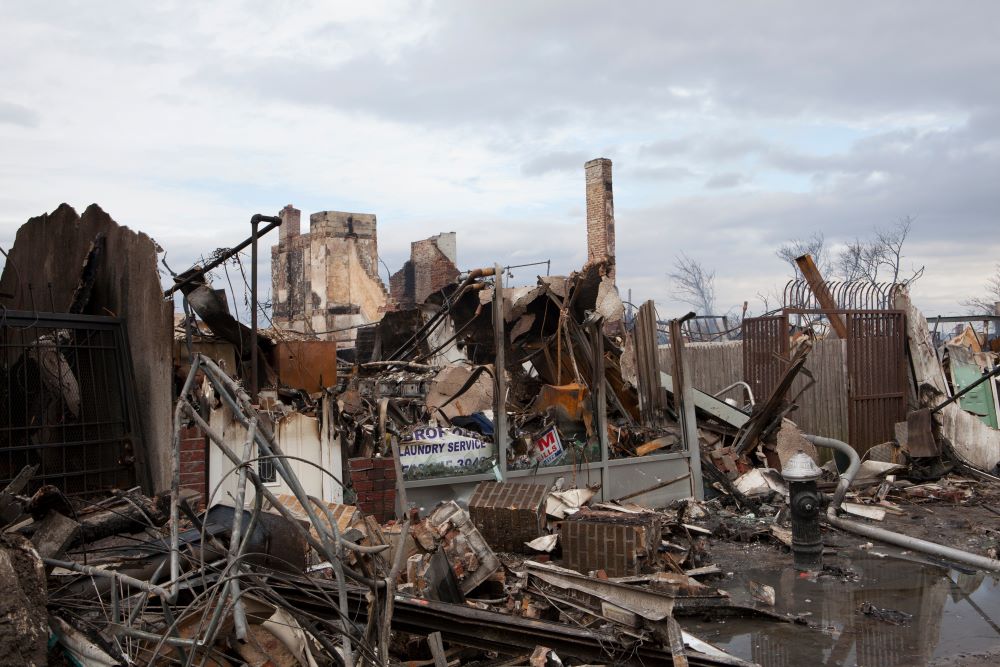
Environmental Impact of Residential Demolition Services
A necessary component of construction and urban development projects is the demolition of residential buildings. Demolition of existing homes can affect the environment in a big way, whether it’s for infrastructure, commercial buildings, or new housing. The environmental effects of residential demolition must be carefully considered, from the emissions from heavy machinery to the creation of construction waste.
OUR SERVICES
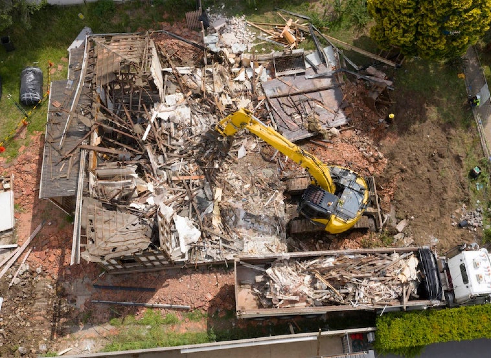
Structure Demolition. Residential, Commercial & Industrial
If your structure poses a health, safety, or environmental risk, demolition can prevent costly citations or fatal accidents. While this may seem daunting, you are just a phone call away from having your residential demolition done professionally, responsibly, and at a great price.
Talk to a Demolition Specialist Now! 916.249.5001
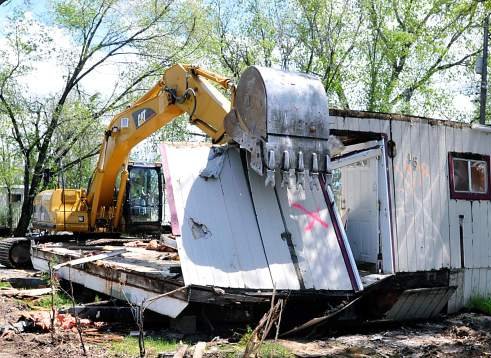
Mobile Home Demolition
We demolish and haul away mobile homes. Any size, anywhere, anyhow. We are fast, clean and competitive. We serve most of Northern California. There are many factors to consider when removing or demolishing your old trailer, mobile home, or manufactured home like: the processes involved, costs, time, contractors, debris, and permits.
Talk to a Demolition Specialist Now! 916.249.5001
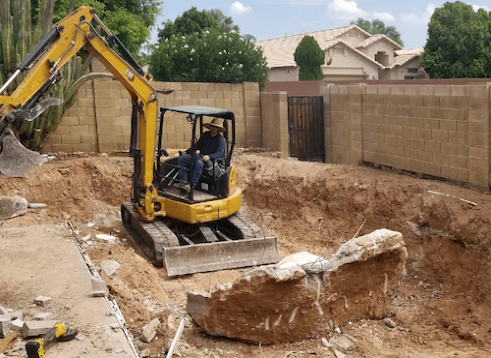
Pool Demolition
When removing a pool in Sacramento, California with the professional demolition team of Maxton Demo, you’re guaranteed peace of mind from beginning to end. From your initial request for an estimate to clean-up, you can expect our pool demolition process that’s completely professional and safe.
Talk to a Demolition Specialist Now! 916.249.5001
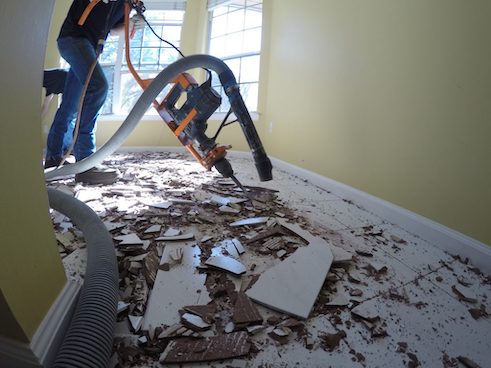
Floor Demolition
Flooring demolition, like any other major home renovation work, requires a specific set of skills and tools to be performed properly. You need experts in flooring demolition to get you the best floors possible. Contact us to find out more about how we can help you today.
Talk to a Demolition Specialist Now! 916.249.5001
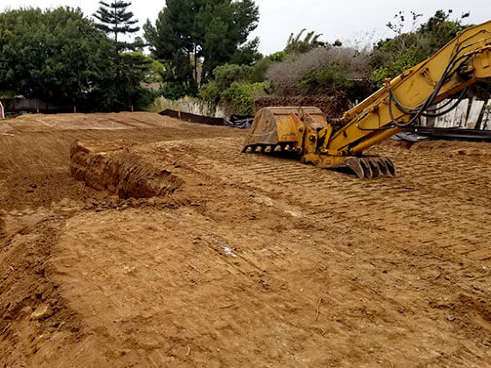
Grading & Excavating
If you need an experienced excavator and grader in Sacramento, call us today. One of the many reasons that residential, commercial, and industrial customers choose to work with us is because we’re able to provide a broad range of services to help construction-related projects get done in less time and at a reduced cost.
Talk to a Demolition Specialist Now! 916.249.5001

Roof Snow Removal
Heavy snow & ice dams can cause significant roof and home damage. Roof Snow removal is our specialty during the winter months. Serving the Sacramento, California area for 10 years, we can get your roof snow removed and promise a quick response and reasonable rates.
Talk to a Demolition Specialist Now! 916.249.5001
The Significance Of Environmentally Friendly Demolition Methods
A greater focus is being placed on implementing sustainable practices in all facets of the building process, including demolition, as the construction industry develops. Sustainable demolition entails a comprehensive strategy that places an emphasis on waste reduction, resource conservation, and environmental protection.
A fundamental tenet of sustainable demolition is meticulous planning and implementation of the demolition procedure. This entails performing in-depth analyses of the building that has to be demolished, locating any potentially dangerous materials, and creating a detailed plan for their safe removal and disposal. Demolition companies can drastically lessen the effects of their operations by proactively addressing potential environmental concerns.
The effective management of construction waste is a crucial component of sustainable demolition. Sustainable practices promote the recycling and repurposing of as much material as possible rather than just disposing of all demolition debris in landfills. By doing this, the quantity of waste that ends up in landfills is decreased, natural resources are preserved, and the demolition process’s carbon footprint is decreased.
Typical Environmental Problems Arising From Residential Demolition
The potential release of asbestos is one of the most important environmental issues related to residential demolition. In older homes, asbestos was frequently used in construction. When these buildings are demolished, asbestos fibers can become airborne and pose a serious health risk to workers and nearby residents. Numerous respiratory conditions, such as mesothelioma and lung cancer, have been related to asbestos exposure.
Lead-based paint leaks during demolition are another frequent source of environmental concern. Lead-based paints, which can be toxic if swallowed or inhaled, were used to paint many older homes. Lead particles can contaminate nearby soil and water when these paints are disturbed during demolition, endangering the health of nearby residents and wildlife.
Apart from potentially dangerous substances, demolishing residential buildings can also produce substantial quantities of construction waste, encompassing metal, wood, concrete, and additional building materials. This waste can wind up in landfills if it is not managed properly, adding to the growing issue of waste accumulation and resource depletion. Reducing the environmental effect of residential demolition requires sustainable demolition techniques that give priority to recycling and repurposing of these materials.
Materials From Destroyed Homes Can Be Recycled And Used Again
Recycling and reusing materials from demolished structures is one of the most important ways to lessen the environmental impact of residential demolition. Many building materials used in residential construction, like metal, wood, and concrete, can be recovered and repurposed for new projects, diverting waste from landfills and lowering the demand for virgin resources.
For instance, concrete can be crushed and utilized as base material for sidewalks and roads, or it can be used as aggregate in new construction projects. Reclaimed wood from destroyed houses can be used to make cabinets, furniture, or even as fuel in biomass energy plants. Metals, like aluminum and copper, can be melted down and used again to create new goods.
Through the adoption of a circular economy strategy in demolition, which involves the continuous reuse and recycling of materials, demolition companies can effectively mitigate the environmental impact of their operations. By doing this, the construction industry becomes more ecologically conscious and sustainable by preserving natural resources and minimizing the quantity of waste that ends up in landfills.
Technology’s Role In Lessening Residential Demolition’s Negative Environmental Effects
Reducing the environmental impact of residential demolition has also been made possible by technological advancements. Technology has allowed demolition companies to streamline their processes and reduce their environmental impact through the use of specialized equipment and data-driven decision-making.
Robotic and remote-controlled demolition equipment is one instance of how technology has advanced in the demolition sector. The amount of dust and debris produced overall during the demolition process can be decreased by using these machines to precisely target and remove particular building components. Furthermore, in order to further minimize the release of dangerous pollutants into the environment, these technologies can be fitted with sophisticated emission control systems.
The application of building information modeling (BIM) software is another technological advancement that has lessened the environmental effect of residential demolition. With the aid of BIM, demolition firms can produce intricate digital models of the buildings they are tearing down. These models can be utilized to plan the demolition procedure, identify potentially dangerous materials, and maximize material recycling and reuse. Through the utilization of data-driven tools, demolition companies can enhance their decision-making abilities and adopt more environmentally friendly procedures.
Alternatives And Methods For Green Demolition
The development of “green demolition” practices has garnered increasing attention as the construction industry moves closer to a more sustainable future. The preservation of resources, waste reduction, and environmental protection are given top priority in these alternate methods of demolishing residential buildings.
A fundamental tenet of environmentally conscious demolition is “deconstruction,” which refers to the method of carefully dismantling a structure as an alternative to the conventional demolition process. Reusing and salvaging building materials through deconstruction lowers the quantity of waste that is dumped in landfills. This strategy not only lessens the impact on the environment but also opens up possibilities for the reuse of priceless materials in brand-new construction projects.
Selective demolition is another method of green demolition in which particular building elements are taken down and repurposed. Architectural elements that can be salvaged, sold, or donated for use in other projects include doors, windows, and fixtures. Demolition companies can reduce their overall waste output and help create a more sustainable construction sector by applying a more selective approach to demolition.
Green demolition techniques can include selective demolition, deconstruction, and the use of different disposal techniques for demolition waste. This can involve researching cutting-edge waste-to-energy technologies, forming alliances with waste management firms that specialize in recycling building materials, and setting up on-site recycling facilities.
Green Residential Demolition: Reducing Impact on the Environment
The building sector has started to adopt more environmentally friendly methods as people’s awareness of the need for sustainable practices has grown. One such topic of interest is residential demolition, where using conventional techniques has frequently had a negative impact on the environment. However, by implementing cutting-edge methods and strategies that put sustainability first, eco-friendly residential demolition seeks to reduce this impact.
Eco-friendly demolition is based on the understanding that demolishing a building can have a significant impact on the environment. The traditional method of demolishing homes has frequently had a negative impact on the environment, from the energy-intensive machinery employed to the disposal of waste materials. By taking a more responsible and comprehensive approach, eco-friendly demolition, on the other hand, aims to address these issues.
By definition, environmentally friendly residential demolition refers to a collection of procedures and tools designed to lessen the process’s negative effects on the environment. This might include a variety of tactics, such as the methodical sorting and recycling of materials or the careful selection of machinery and equipment. The ultimate objective is to reduce waste, preserve resources, and make sure that the demolition process has the least amount of carbon impact possible.
Traditional Residential Demolition’s Effects On The Environment
Conventional residential demolition techniques frequently lead to the depletion of natural resources, the release of hazardous pollutants, and the production of enormous volumes of waste, all of which can have a negative effect on the environment. One of the main issues is that the demolition process is very energy-intensive, requiring a lot of heavy machinery and equipment that uses a lot of fossil fuels.
The local air quality may be adversely affected by the emissions from these machines as well as the dust and debris produced during the demolition. Due to the concentration of residential demolition projects in urban areas, this can be especially problematic. Furthermore, the noise pollution that is produced during the demolition process has the potential to negatively impact the local ecosystem and disturb the community nearby.
One of the main issues with conventional residential demolition is how to properly dispose of the waste. Wood, metal, concrete, and other building materials are among the materials that frequently wind up in landfills or incinerators, adding to the expanding issue of waste management. These materials’ breakdown in landfills may also release greenhouse gases, worsening the effects on the environment.
Eco-Friendly Residential Demolition’s Advantages
There are several advantages to the transition to environmentally friendly residential demolition for both the environment and the building industry. Eco-friendly demolition techniques provide a more responsible and progressive approach to the demolition process by emphasizing sustainability and reducing environmental harm.
The decrease in waste is one of the main advantages of environmentally conscious residential demolition. Strong recycling and repurposing initiatives enable environmentally conscious demolition contractors to divert a large amount of waste from landfills and incinerators. Because the salvaged materials can be upcycled into new products or used in new construction projects, this not only lessens the burden on waste management systems but also conserves natural resources.
Reducing greenhouse gas emissions is another important benefit of environmentally friendly residential demolition. The carbon footprint of eco-friendly contractors’ operations can be considerably reduced by using low-emission machinery and equipment and energy-efficient practices all throughout the demolition process. This is consistent with the larger worldwide initiatives to lessen the consequences of climate change and encourage more sustainable development.
In addition to its positive effects on the environment, environmentally friendly residential demolition can also be profitable. Homeowners and contractors can lower the cost of buying new materials for construction projects by salvaging and repurposing materials. Furthermore, eco-friendly demolition contractors may attract more clients who are environmentally conscious as a result of the growing demand for sustainable practices in the construction industry, which could result in more business opportunities.
Methods For Reducing Environmental Damage When Demolishing
Removing residential buildings in an environmentally friendly manner necessitates a multidimensional strategy that minimizes damage to the environment. Using machinery and equipment for demolition with caution is one of the main tactics. Eco-friendly contractors can drastically lower the demolition process’s carbon footprint by using fuel-efficient, low-emission machinery.
Dust control measures are another crucial component of environmentally friendly demolition. The air quality and the surrounding environment may suffer if particulate matter is released during the demolition process. Eco-friendly contractors can lessen the effects of airborne pollutants by putting in air filtration devices, employing water-based suppression systems, and using other dust control methods.
When it comes to eco-friendly residential demolition, noise pollution is another issue that needs to be taken into consideration. The disruptive effects of the demolition process on the neighborhood and the surrounding ecology can be lessened with the use of specialized equipment, such as hydraulic crushers and low-noise demolition tools. Furthermore, minimizing the duration and frequency of noise-generating events can be achieved through meticulous planning and scheduling of demolition activities.
Handling and discarding hazardous materials with caution is one of the most important parts of environmentally friendly residential demolition. Lead-based paint, asbestos, and other potentially dangerous materials can be found in many older homes. For the identification, containment, and safe removal of these materials, eco-friendly contractors are required to adhere to stringent protocols, guaranteeing that their disposal is ecologically sound.
Environmentally Friendly Removal Of Dangerous Substances
As much material as possible is recycled and repurposed during eco-friendly residential demolition, but some hazardous materials will unavoidably need to be disposed of properly. These may include materials that were frequently used in older homes and have the potential to be harmful, such as asbestos and paint containing lead.
When it comes to the handling and disposal of hazardous materials, environmentally friendly contractors are subject to stringent regulations and guidelines. The process usually entails the utilization of specialized apparatus and personal protective equipment, along with the cautious containment and conveyance of these materials to authorized disposal sites.
Reducing waste is one of the most important parts of environmentally friendly hazardous material disposal. By investigating alternatives for the stabilization and treatment of hazardous materials, eco-friendly contractors can lower the total amount of waste that needs to be disposed of by a professional. In order to change hazardous materials into a more stable and less dangerous form, methods like solidification, stabilization, or encapsulation may be used.
Eco-friendly residential demolition places a strong emphasis on tracking and documenting every step of the process, in addition to the appropriate disposal of hazardous materials. This promotes accountability and transparency for homeowners and the larger community, while also ensuring adherence to pertinent regulations.
Green Building Techniques Are Being Used In Residential Demolition
Sustainable residential demolition encompasses more than just the actual demolition procedure; it also entails incorporating green building principles into a project’s whole life cycle. This covers the phases that follow—the planning and design stages as well as the building and reconstruction stages.
Using sustainable building materials is one of the most important green building techniques that can be applied to environmentally friendly residential demolition. Choosing low-embodied energy materials, such as bamboo, recycled plastic, or locally produced and renewable resources, is one way to achieve this. Eco-friendly contractors can further minimize the environmental impact of the construction process by giving priority to the use of these materials.
In residential demolition, energy-efficient design and construction methods are crucial components of green building practices. High-performance insulation, energy-efficient appliances and systems, and passive solar design are a few examples of how to achieve this. Eco-friendly residential demolition projects can contribute to a reduction in the home’s overall energy consumption and carbon footprint by integrating these features into the new construction.
In residential demolition, water conservation is another essential element of green building practices. Eco-friendly contractors can reduce the need for freshwater resources by using techniques like drought-resistant landscaping, greywater recycling, and rainwater harvesting. Long-term cost savings for homeowners are another benefit of these actions, in addition to their contribution to environmental sustainability.
The Financial Aspects Of Environmentally Friendly Residential Demolition
Although there is no doubt about the environmental advantages of eco-friendly residential demolition, there is frequently a misconception that these environmentally friendly methods are more expensive. But in actuality, the financial benefits and long-term cost reductions associated with environmentally friendly demolition frequently exceed the initial outlay.
The purchase of specialized tools and technologies is one of the most important financial factors in environmentally friendly residential demolition. The project’s initial costs may increase with the use of fuel-efficient equipment, dust control systems, and specialized techniques for handling and disposing of hazardous materials. Nevertheless, over time, these expenditures may prove beneficial due to decreased energy usage, decreased costs associated with disposing of waste, and the possibility of material recovery and repurchasing.
It’s also important to take into account the labor and knowledge needed for environmentally friendly demolition. Experts with training who understand how to handle hazardous materials safely and sustainably might charge more for their projects or at a higher hourly rate. Nevertheless, their contribution to environmental responsibility and compliance may exceed the extra expenses.
Eco-friendly demolition techniques can be supported by a number of financial and non-financial incentives that homeowners and contractors can investigate. For projects that satisfy certain sustainability requirements, some jurisdictions provide tax credits, rebates, or other financial incentives. By doing so, eco-friendly residential demolition becomes a more appealing and feasible option by partially offsetting the initial costs.
Adopting Environmentally Responsible Methods When Demolishing Homes
Construction companies have a vital role to play in reducing environmental harm as the need for sustainable practices becomes more widely recognized. In this context, eco-friendly residential demolition is essential because it provides a more responsible and progressive method of demolishing homes.
The environmental impact of residential demolition projects can be considerably decreased by eco-friendly demolition contractors by implementing cutting-edge methods and industry best practices. These sustainable practices can lessen the effects of climate change, reduce waste, and conserve natural resources. They range from the careful selection of machinery and equipment to the careful recycling and repurposing of materials.
It is the duty of both homeowners and contractors to adopt these sustainable practices as the market for eco-friendly construction grows. We can safeguard the environment and benefit economically from a more sustainable construction method by giving priority to environmentally friendly residential demolition.
The construction industry’s dedication to environmental stewardship is ultimately demonstrated by the shift towards environmentally friendly residential demolition. One demolition project at a time, we can set the standard for sustainable practices and create a future that is more resilient and green.
Do you have a Question?
Talk to a Demolition Specialist Now! 916.249.5001
Request Formal Quote